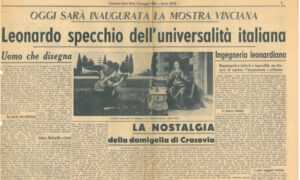The workshop “Staging italianità between Race, Science, and the Arts. Museum, Exhibitions, Festivals and the Making of Identities in Italy 1911-1967” makes a close connection between exhibitions (and museums, fairs, expos, festivals…) and the making of identities, both the Italian national identity and those of “the others” (non-European peoples, colonial subjects, but also archaic humans…), built through temporary exhibitions among other media. The workshop insists on an unprecedented chronology, which from the liberal age includes and goes beyond Fascism into the Republican era, highlighting the long development of a certain discourse on italianità and the longevity of the exhibition media as a means to narrate it.
 Starting with the 1911 exhibition to celebrate the fiftieth anniversary of the Unification of Italy, museums, exhibitions and fairs were used to try to define what was Italian and what was not. From the race-themed exhibitions of the late 1930s in Turin and Naples, and those dedicated to the great “Italian” scientists such as Da Vinci and Galileo, to the exhibitions dedicated to prehistoric art in the peninsula (1957, in Florence), the construction of the Italian identity invested every field of science and the arts. Italy’s place in the world and its relations with “the other”, moreover, is a concern that accompanied the difficult transition from Fascism to the Republic, as witnessed by the “Fiera del Mediterraneo” in Palermo and “Fiera del Levante” in Bari in the 1950s, or the international documentary film festival “Festival dei Popoli” in the 1950s and 1960s.
Starting with the 1911 exhibition to celebrate the fiftieth anniversary of the Unification of Italy, museums, exhibitions and fairs were used to try to define what was Italian and what was not. From the race-themed exhibitions of the late 1930s in Turin and Naples, and those dedicated to the great “Italian” scientists such as Da Vinci and Galileo, to the exhibitions dedicated to prehistoric art in the peninsula (1957, in Florence), the construction of the Italian identity invested every field of science and the arts. Italy’s place in the world and its relations with “the other”, moreover, is a concern that accompanied the difficult transition from Fascism to the Republic, as witnessed by the “Fiera del Mediterraneo” in Palermo and “Fiera del Levante” in Bari in the 1950s, or the international documentary film festival “Festival dei Popoli” in the 1950s and 1960s.
“Staging italianità” in particular investigates exhibitions as sites where visions of Italy were stored, establishing the very (racial) borders of the Italian identity, and the gazes on that identity were cataloged, using, within the display, a variety of other media, such as film, photography, collage, painting, diorama, and so on.
If defining italianità on all levels meant highlighting what Italians were and had been through the centuries (e.g. “genius” and “pioneers” in science and the arts), it also meant to emphasize what Italians, by contrast, were not. Museums display, expos, trade shows and fairs will be therefore considered as a place where belonging, inclusion and othering were staged, and nationality was built.
Workshop 26 September
10.00 Welcome by Dr. Maria Bonaria Urban (Director of Studies in History at KNIR)
10.15 Workshop Introduction by Dr. Beatrice Falcucci (KNIR Fellow)
10.30 Panel 1
Agnese Ghezzi (IMT, Lucca): Building the visual archive of the Italian “stirpe” for the Mostra di Etnografia Italiana, Rome 1911
Maria Bonaria Urban (KNIR): All’origine del museo etnologico missionario: cattolicesimo e alterità nelle collezioni fotografiche vaticane
Maddalena Cataldi (École française, Rome): Prehistory in Rome. Staging science and religion as sources of Catholic universalism at the Vatican Missionary Exhibition of 1925
Elena Canadelli (Università di Padova): Displaying Science in Interwar Italy between “cimeli” and “primati”
14.30 Panel 2
Matilde Cartolari (Technische Universität, Berlin): Genealogies of the Empire: The Exhibition of Italian Portrait in Belgrade (1938)
Tommaso Dell’Era (Università della Tuscia): La Mostra nazionale della razza nell’ambito della politica razzista e antisemita del fascismo (1938-1940)
Beatrice Falcucci (KNIR/Università dell’Aquila): Le mostre “coloniali” nella fototeca della Biblioteca IsIAO: dal fascismo all’AFIS.
Valentina Bartalesi, Tommaso Casini (IULM): Un’esposizione alle radici del tempo: Paolo Graziosi, Carlo L. Ragghianti e la Mostra di arte preistorica alla Firenze (1957)
Luca Peretti (University of Warwick): Popoli and the others. Film festivals and third-worldism in Italy
17.00 Break
17.30 KNIR Research Dialogue by Mariana Françozo (Leiden University) as keynote of the workshop: Museums as Archives: Cultural Emergence, Disappearance, and Reemergence through Museum Collections. Please note that you have to register your participation for the keynote separately by writing an e-mail to secretary@knir.it (for attending at KNIR) or by registration on ZOOM (for attending online).


